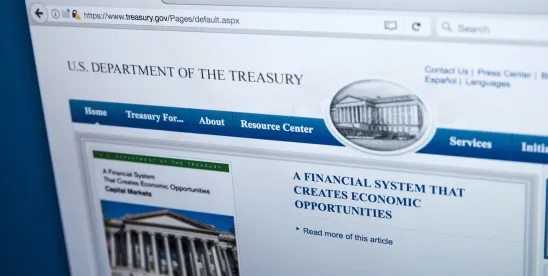In our previous article on this topic (which you can read here), we analyzed recent enforcement activity by the U.S. Department of the Treasury’s Office of Foreign Assets Control (“OFAC”) related to the maritime transport of Russian-origin crude oil and Russian-origin petroleum products above price caps agreed by the “Price Cap Coalition,” comprising Australia, Canada, France, Germany, Italy, Japan, the European Union, the United Kingdom, and the United States.
In this second article, we focus on recent OFAC guidance that serves to shield U.S. Persons [1] providing “Covered Services,” including trading/commodities brokering, financing, shipping, insurance, flagging, and customs brokering, from strict liability for sanctions violations in cases where those U.S. Persons inadvertently deal in the purchase of Russian oil or Russian petroleum products sold above the relevant price cap owing to falsified or erroneous records provided by those who act in bad faith or make material misrepresentations. We also summarize seven recommendations published by the Price Cap Coalition to promote responsible practices in the industry and disrupt sanctioned trade.
Updated OFAC Guidance on Implementation of the Price Cap Policy
On December 20, 2023, OFAC updated its Guidance on the implementation of the price cap policy that was first issued on February 3, 2023.[2] In addition to clarifying details of the price cap policy, the Guidance established a recordkeeping and attestation process that offers a safe harbor from OFAC enforcement for U.S. service providers who in good faith inadvertently participate in the sale, purchase or transfer of Russian crude oil and/or petroleum products above the relevant price cap. OFAC clearly states the rationale for the safe harbors in the Guidance:
“OFAC would not pursue a penalty against a U.S. service provider that reasonably relies on the documentation or attestations described above, unless the U.S. provider knew or had reason to know that such documentation was falsified or erroneous or that the Russian oil was purchased above the relevant price cap . . . . OFAC intends to focus its enforcement responses on those actors who willfully violate or evade the price cap.”[3]
In the Guidance, OFAC divides service providers into three “tiers” of actor, depending upon their access to price information in the ordinary course of business, and provides direction to each tier of actor regarding the requirements with which they must comply in order to be afforded safe harbor relief:
- Tier 1 actors are those that typically have direct access to price information, such as commodities brokers and traders. To be afforded safe harbor protection, they mut retain documents showing that Russian oil or Russian petroleum products were purchased at or below the relevant price cap, including itemized ancillary costs, and provide such information to other actors (or attest to the same) as needed or upon request. Such documentation may include invoices, contracts, or receipts/proof of payment.
- Tier 2 actors are those that are sometimes able to request price information, such as financial institutions involved in deals in a trade financing capacity, customs brokers, and shipping agents. To be afforded safe harbor protection, they must request and retain documents that show that Russian oil or Russian petroleum products were purchased at or below the relevant price cap, including itemized ancillary cost information, or if not practical, attestations of the same from other actors.
- Tier 3 actors are those without direct access to price information, such as insurers, Protection and Indemnity (“P&I”) clubs, ship owners/carriers, and flagging registries. They must obtain and retain attestations in which other actors commit that for the service being provided, the Russian oil or Russian petroleum products were purchased or will be purchased at or below the relevant price cap.
OFAC also recommended various risk-based measures for compliance with the price cap. For example, service providers should update their standard documentation such as contractual terms and conditions, invoice structures, or requests for information or sanctions questionnaire templates. Service providers should also provide compliance training to employees.
Price Cap Coalition Advisory Promoting Compliance Best Practices
The December Guidance followed an earlier Price Cap Coalition Advisory for the maritime oil industry and related sectors,[4] published by OFAC on October 12, 2023. The Advisory cautioned that “shadow trade” has been become more pronounced, often involving actors and cargo affiliated with sanctioned countries or persons, or associated with other illicit activity.[5]
It also provided seven best practice recommendations to ensure compliance to the greatest possible extent with the price cap, including requiring appropriately capitalized P&I insurance (Recommendation #1), receiving classification from an International Association of Classification Societies (“IACS”) member society (#2), and deploying Automatic Identification Systems (“AIS”) vessel tracking technology continuously throughout the lifetime of voyages (#3), which legitimate industry participants routinely require, receive and deploy. In addition, industry participants should monitor ship-to-ship transfers (as they are high risk for sanctions evasion and other risks such as environmental damage) (#4), itemize payments for ancillary shipping costs (such as customs and insurance costs) at commercially reasonable rates (#5), undertake appropriate due diligence, including on vessels that have undergone numerous administrative changes (such as frequently reflagging) and in dealings involving intermediaries such as management companies, traders, brokerages (which could be used to conceal true beneficial ownership) (#6). Finally, industry participants are encouraged to report suspected breaches of the oil price cap in an effort to collectively protect the trade from malign activity (#7).
Additional Considerations
A recent report by the Centre for Research on Energy and Clean Air (“CREA”), a think tank collaboration with Politico, suggests that, while the price cap may have cost the Kremlin USD 34 billion in export revenues in 2023, Russian oil continues to sell for USD 70 or more per barrel, which “will not affect revenue enough to limit Russia’s resources”[6] vis-à-vis Ukraine. The principal reason for this is “widespread circumvention,” “gaping loopholes,” “inadequate monitoring and enforcement,” and “Western nationals failing to crack down on sanctions.”[7]
It is very clear from OFAC’s recent actions that, contrary to the concerns discussed in the CREA report, it will continue to closely scrutinize marine shipping activities for evidence of sanctions evasion, including related to the maritime transport of Russian-origin crude oil and petroleum products in violation of the price cap. We expect that OFAC will continue to designate violative actors under the broad authority granted to it by Executive Order 14024. While OFAC made it clear that it intends to focus its enforcement actions on those actors who willfully violate or evade the price cap,[8] it may also investigate and penalize U.S. service providers pursuant to Executive Order 14071 if they provide Covered Services relating to the maritime transport of Russian oil and Russian petroleum products above the price cap and fail to follow the attestation and recordkeeping processes necessary to benefit from safe harbor protection. Consequently, maritime industry participants should be mindful of inadvertently violating the price cap as a result of their counterparties’ deceptive shipping practices. They must be cognizant of price bundling, spoofing, shadow trading, and the use of little-known traders with opaque ownership structures, among other red flags.
[1] U.S. citizens and permanent residents, U.S. companies (including foreign branches), and anyone in the U.S. (which generally includes U.S. branches of foreign entities, as well as any individuals who are physically in the U.S.) are collectively referred to as “U.S. Persons.”
[2] OFAC, “OFAC Guidance on Implementation of the Price Cap policy for Crude Oil and Petroleum Products of Russian Federation Origin” (issued on February 3, 2023, and revised December 30, 2023), https://ofac.treasury.gov/media/931036/download?inline.
[3] OFAC, “OFAC Guidance on Implementation of the Price Cap policy for Crude Oil and Petroleum Products of Russian Federation Origin” (issued on February 3, 2023, and revised December 30, 2023), pp. 12-13, https://ofac.treasury.gov/media/931036/download?inline.
[4] Price Cap Coalition, “Price Cap Coalition Advisory for the Maritime Oil Industry and Related Sectors” (October 12, 2023), https://home.treasury.gov/news/press-releases/jy1797.
[5] Ibid.
[6] Politico, “Russian oil price cap has largely failed, new report finds” (December 5, 2023), https://www.politico.eu/article/russia-oil-price-cap-ukraine-war-centre-research-energy-clean-air/.
[7] Ibid.
[8] OFAC, “OFAC Guidance on Implementation of the Price Cap policy for Crude Oil and Petroleum Products of Russian Federation Origin” (issued on February 3, 2023, and revised December 30, 2023), p. 13, https://ofac.treasury.gov/media/931036/download?inline.




 />i
/>i

